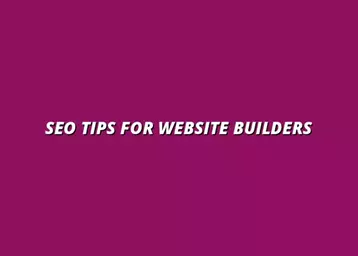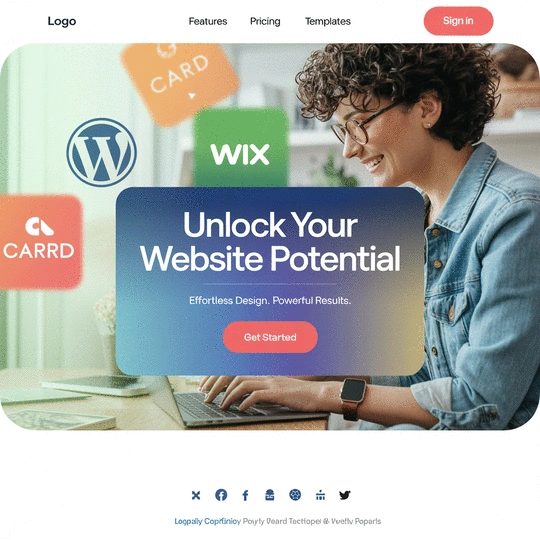WordPress Guide for New Users

Posted on: 2025-08-05
By: Elena Rivers
Choosing the right platform for your website can feel overwhelming, especially with so many options out there. But what if you could simplify the process and build a stunning site in just a few steps? With WordPress, you can! This guide unlocks the essentials you need to know to get started effectively.
What You Will Learn
- WordPress powers over 40% of websites, making it a reliable and popular CMS for beginners and experts alike.
- Understand the key differences between WordPress.org (self-hosted) and WordPress.com (hosted) to choose the right option for your needs.
- Learn about essential features such as customizable themes and an extensive plugin library that enhance your site's functionality.
- Discover crucial steps for launching your site, including selecting a hosting provider, securing your site with SSL, and optimizing for SEO.
- Engage with the vibrant WordPress community for support, resources, and feedback to continuously improve your website.
Key Features Comparison: WordPress.org vs. WordPress.com
Understanding the differences between WordPress.org and WordPress.com can help you make an informed decision for your website. If you're wondering whether to choose Wix or WordPress, a beginner's guide can provide further clarity on which platform best suits your needs.
WordPress.org
Full control over your site, self-hosted, requires domain and hosting purchase. Ideal for those wanting customization.
WordPress.com
Hosted service with limited customization unless a premium plan is purchased. Great for beginners wanting simplicity.
Cost
WordPress.org: Requires hosting fees. WordPress.com: Free with options to upgrade.
Plugins & Themes
WordPress.org: Thousands of plugins and themes available. WordPress.com: Limited selection unless premium.
Comprehensive Guide to Setting Up Your WordPress Site
Welcome to your journey into building a stunning WordPress site! As someone who’s passionate about helping beginners like you, I find that understanding the basics is crucial. WordPress is a fantastic content management system (CMS) that allows you to create anything from personal blogs to professional portfolios. Let's dive into the essentials of setting up your WordPress site together!

Understanding WordPress: Your Go-To Content Management System
WordPress is the most popular CMS globally, powering over 40% of all websites. Its flexibility and ease of use make it a favorite among beginners and seasoned developers alike. You don’t need extensive technical skills to get started, and that's what I love about it!
With WordPress, you can not only create and publish content effortlessly but also manage everything from themes to plugins. Here are key features that make WordPress stand out:
- User-Friendly Interface: The dashboard is intuitive, making it easy to navigate.
- Extensive Plugin Library: There are thousands of plugins for added functionality, from SEO tools to e-commerce solutions.
- Customizable Themes: You can select from a multitude of themes to match your vision.
Exploring WordPress.org vs. WordPress.com: Which Should You Choose?
Choosing between WordPress.org and WordPress.com can be a bit confusing at first, but I’m here to help clarify things! Let’s break down the differences:
- WordPress.org: This is self-hosted, which means you’ll need to buy hosting and a domain but get full control over your site.
- WordPress.com: This is hosted for you with limited customization unless you opt for a premium plan.
For beginners looking to build a professional online presence, I often recommend WordPress.org. It gives you the freedom to grow and expand your site as needed! For a broader understanding of website creation, consider exploring a beginner's guide to building a website.
Why Choose WordPress for Your Website Needs?
There are countless reasons to choose WordPress for your website, especially if you’re just starting out. Here are a few compelling reasons that resonate with my own experiences:
- Cost-Effective: WordPress is free to use, with many free themes and plugins available.
- SEO-Friendly: WordPress is built with SEO in mind, making it easier to optimize your site for search engines.
- Community Support: A vast community exists to help you with tutorials, forums, and guides—just like this one!
By choosing WordPress, you’re setting yourself up for success in the long run. It's a platform that scales with you as your needs evolve!
Essential Steps to Launching Your WordPress Website
We Want to Hear From You!
As you embark on your WordPress journey, we’d love to know: What aspect of setting up your site excites you the most? Is it choosing the perfect theme, exploring plugins, or perhaps learning about SEO? Share your thoughts below:
Summarizing Your WordPress Launch Journey
Congratulations! You’ve taken some significant steps in setting up your WordPress site. It’s important to take a moment to reflect on your progress. Each step you’ve tackled has brought you closer to your online presence. Let’s summarize some key takeaways from this journey that will help you as you continue on your path.
- Defined your website's purpose and chosen the right platform.
- Selected a hosting provider that suits your needs.
- Secured your site with an SSL certificate.
- Explored the WordPress dashboard and configured essential settings.
- Picked a theme that aligns with your brand and optimized it for SEO.
By hitting these major milestones, you’ve laid a solid foundation for your website. Remember, the journey doesn't end here! It’s all about continuous improvement and adapting to what works best for you and your audience.

Next Steps: Continuous Improvement and SEO Monitoring with Analytics
As you move forward, keep in mind that the world of websites is always changing. Continuous improvement is crucial! One way to do this is by monitoring your website’s performance through analytics tools. Google Analytics is a fantastic starting point to track visitor behavior and identify areas for enhancement.
- Set up Google Analytics to monitor traffic and user behavior.
- Check your site’s loading speed—slow sites can deter visitors!
- Regularly update content to ensure it remains relevant and useful.
- Engage with your audience through comments and feedback.
These steps will help you not only maintain but grow your site over time. Remember, you’re not alone in this process; the community at Website Design Free is here to support you every step of the way!
Engaging with the WordPress Community
One of the most rewarding aspects of launching your WordPress site is connecting with others in the WordPress community. This community is vast and filled with valuable resources that can help you expand your knowledge and skills. Don't forget to check out an essential website toolkit for members to further enhance your site-building journey.
- Join online forums related to WordPress for discussions and support.
- Follow blogs that provide regular updates and tips on web design.
- Participate in social media groups where you can share ideas and ask questions.
- Attend local meetups or virtual events to network and learn from others.
Engaging with these resources will not only enhance your skills but also provide a sense of camaraderie and support. Remember, we all start somewhere, and sharing experiences can inspire both you and others in the community!
Inviting Feedback and Sharing Your Experience with the Community
Don’t shy away from sharing your journey! By inviting feedback and sharing your experiences, you can contribute to the community and help others who may be in similar situations. Consider writing a blog post about your launch journey or sharing insights on forums.
- Ask for constructive criticism from friends or community members.
- Share tips and tricks that worked for you during the setup process.
- Offer assistance to newcomers who might be struggling.
Your unique experience can empower others to take the plunge into web design. Plus, you’ll learn so much in the process! Let’s keep the conversation going—together, we can create a vibrant community where everyone feels supported and inspired!
Frequently Asked Questions (FAQs)
- 1. What is the main difference between WordPress.org and WordPress.com?
- WordPress.org is a self-hosted platform, giving you full control and requiring you to purchase your own hosting and domain. WordPress.com is a hosted service with limited customization unless you opt for a premium plan, making it simpler for beginners.
- 2. Why is WordPress considered SEO-friendly?
- WordPress is built with SEO principles in mind, which helps optimize your site for search engines. It also offers numerous plugins specifically designed to boost your site's SEO, such as Yoast SEO or Rank Math.
- 3. Do I need technical skills to build a website with WordPress?
- No, you don't need extensive technical skills. WordPress offers a user-friendly interface and a vast array of themes and plugins that simplify the website creation process, making it accessible for beginners.
- 4. What are some essential steps to launch a WordPress website?
- Key steps include defining your website's purpose, choosing between WordPress.org and WordPress.com, selecting a reliable hosting provider, securing your site with an SSL certificate, exploring the WordPress dashboard, picking and customizing a theme, and optimizing for SEO.
- 5. How can I ensure continuous improvement and monitor my website's performance?
- To ensure continuous improvement, regularly update your content, check your site's loading speed, and engage with your audience. You can monitor performance using analytics tools like Google Analytics to track visitor behavior and identify areas for enhancement.
Recap of Key Points
Here is a quick recap of the important points discussed in the article:
- Understanding WordPress: It's a user-friendly CMS that allows easy website creation and management.
- Choosing the Right Platform: WordPress.org offers more flexibility and control compared to WordPress.com.
- Cost-Effective Solution: WordPress is free with many accessible themes and plugins, making it budget-friendly.
- SEO-Friendly: Built-in features assist with optimizing your site for search engines.
- Engaging with the Community: Leverage forums and social media for support and learning.
- Continuous Improvement: Use analytics tools like Google Analytics to monitor performance and make enhancements.
 As the digital landscape continues to evolve, understanding the nuances of SEO becomes vital for any
As the digital landscape continues to evolve, understanding the nuances of SEO becomes vital for any
 Effective design is not just about aesthetics; it plays a crucial role in guiding user behavior and
Effective design is not just about aesthetics; it plays a crucial role in guiding user behavior and
 Choosing the right website builder can be pivotal for your online success. Whether you're a novice o
Choosing the right website builder can be pivotal for your online success. Whether you're a novice o
